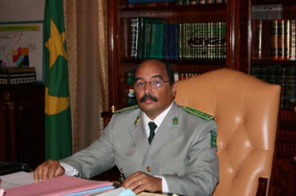Fraud claimed in Mauritius poll
NOUAKCHOTT: The main opposition candidates in Mauritania's presidential ballot said Sunday the vote was rigged, branding the huge lead for ex-junta leader Mohamed Ould Abdel Aziz an "electoral coup."
With 33 percent of ballots counted, the Interior Ministry said Aziz had 51 percent of the vote, compared with 17 percent for parliament speaker Messaoud Ould Boulkheir and 12 percent for veteran opposition leader Ahmed Ould Daddah.
To avoid a runoff, a candidate needs to win more than 50 percent in the first round.
The main opposition candidates, however, rejected the results, declaring the ballot rigged in a joint statement issued by Boulkheir, Daddah and Col. Ely Ould Mohamed Vall, who led an earlier 2005 junta and had 3 percent of the vote so far.
Speaking at a news conference, Boulkheir accused Aziz of falsifying voters and identity cards. "We refuse to recognize these results and call on the international community to create a commission to investigate to expose this manipulation," he told reporters.
In the statement, the opposition candidates said the results had been "prefabricated" and accused Aziz of carrying out "an electoral coup d'etat."
International observers have not yet released their findings on whether the vote was free and fair.
Aziz seized power in an August coup, toppling the country's first freely elected president, who had been elected in 2007.
Saturday's election represents a chance for the coup-plagued desert nation, which straddles the Arab and African worlds, to end decades of military rule and resurrect billions of dollars in frozen aid once pledged by international donors. But in a country where military strongmen wield more power and influence than the constitution or any written law, neither task will be easy.
Mauritania has suffered five coups since independence from France in 1960 and has been led by military rulers for most of the past three decades.
Aziz resigned from the army and gave up his post as junta leader in April so he could legally run in the poll.
A third of the country's 3.5 million people were registered to vote in Saturday's poll.
Aziz has essentially had a monthslong head-start over his main rivals, who joined the race in June after he was forced to accept a deal that replaced the junta with a government of national unity charged with overseeing the ballot.
Aziz was also able to take advantage of the machinery of state to cast himself as "president of the poor," in part by lowering the prices of electricity, water, sugar and gas by as much as 30 percent.
During the campaign, rival parties pitched billowing Arabic-style tents in dunes throughout the countryside and all over sandy Nouakchott roadsides in what amounted to nomad-style advertisements. Each tent was affixed with a candidate's image and contained couches and carpets. Tea was served and politics discussed.
By Saturday, the tents were all but gone, replaced by long lines of men in flowing blue and white robes and women in flowery bright colored wraps. They gathered at polling stations guarded by soldiers toting assault rifles. Voters dropped folded ballots into sealed plastic containers and walked out into the sunlight with indelible purple ink staining their index fingers.






